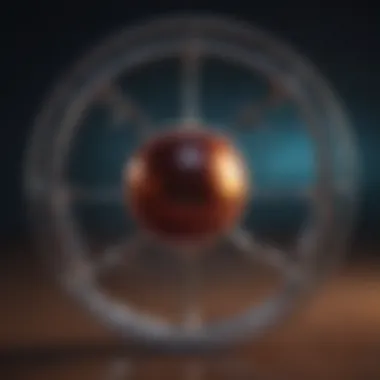Understanding the Algebra of Infinity: Concepts & Impact


Intro
Diving into the algebra of infinity can feel like stepping into a vast ocean where the depths are both intriguing and daunting. This realm of mathematics stretches beyond the finite, challenging our intuition and making us reconsider the very foundations of numerical constructs. While most people are acquainted with the numbers and operations of our everyday math, when it comes to infinite quantities, things get much trickier.
In this space, concepts that seem familiar twist into forms that require an open mind and a thirst for deep understanding. The exploration of infinite sets and operations unveils not just mathematical principles, but also philosophical implications that resonate with how we perceive reality itself. The journey ahead seeks to illuminate these complex topics, ensuring that students, educators, and enthusiasts find value and clarity in an otherwise intricate subject.
Key Research Findings
Overview of Recent Discoveries
Recent advances in the study of infinite algebra reveal fascinating connections between set theory, calculus, and the very nature of mathematical infinity. Researchers have made significant strides in understanding how infinite quantities behave under various operations. Key discoveries include:
- Cardinality: The concept has evolved, leading to a deeper appreciation of different types of infinities. For instance, the distinction between countable and uncountable sets helps understand why not all infinities are created equal.
- Limits and Convergence: New insights into how infinite processes can yield finite results—like in calculus with limits—are reframing how we approach problems involving infinity.
- Mathematical Structures: The algebraic structures at play when dealing with infinite sets, such as groups and fields, have been critiqued and enhanced, offering fresh perspectives on established theories.
Significance of Findings in the Field
The implications of these findings stretch far beyond the ivory towers of academic institutions. They have a profound impact on various domains:
- Computer Science: Algorithms and data structures that incorporate concepts of infinity can lead to more efficient problem-solving techniques.
- Philosophy: The discussion surrounding the nature of the universe and existence itself frequently intersects with mathematical infinity, prompting deep questions.
- Education: These insights provide invaluable tools for teachers, allowing them to break down complex ideas into digestible pieces for students.
The essence of infinity is not just in its magnitude, but in how it compels us to rethink what we know about mathematics and the universe.
Breakdown of Complex Concepts
Simplification of Advanced Theories
To properly grasp the algebra of infinity, it’s crucial to simplify the advanced theories involved. Here are a few core concepts that require clarification:
- Infinite Sets:
- Operations on Infinite Quantities:
- At a basic level, an infinite set is a collection of elements that can’t be counted. Think of the set of natural numbers—no matter how high you count, there’s always one more.
- Cantor’s work introduced the idea that not all infinite sets are equivalent, which changed the course of mathematical thought.
- Operations such as addition, multiplication, and even subtraction take on unique characteristics in the realm of infinity. Understanding how these operations behave is critical; for example, you can't merely apply the same rules found in finite mathematics.
Visual Aids and Infographics
A picture can be worth a thousand words, especially with something as abstract as infinity. Utilizing visual aids can help solidify comprehension:
- Diagrams of set theory classifications can clarify the differences between various infinite sets.
- Graphs showcasing convergence behaviors in limits can provide insight into how infinite processes manifest.
As we continue exploring our relationship with the infinite, it's essential to remain aware of the subtle nuances that prevent our understanding from becoming tangled in misunderstandings. Next, we will delve deeper into the philosophical implications and how they shape our interpretations of mathematical concepts.
Intro to Infinity
The concept of infinity stands as a cornerstone in mathematics, yet its implications ripple far beyond the confines of numerical calculations. This inquiry into infinity serves as an integral framework for understanding deeper mathematical principles, offering a springboard for both theoretical exploration and practical application. In the context of this article, we will dissect how the algebra of infinity reshapes our comprehension of quantity, structure, and reasoning.
Delving into infinity is akin to peeling onion layers; the more one dives in, the clearer the underlying complexities become. Infinity invites curiosity not just among mathematicians but also among philosophers and scientists. The intricate web of infinite quantities affects a variety of fields including calculus, computer science, and even physics. A grasp of infinite algebra can lead to a more profound appreciation of concepts like limits and continuity, which are pivotal in advanced studies.
Importantly, exploring infinity provides a unique opportunity to challenge conventional thought processes. It encourages thinkers to embrace the abstract, pushing the boundaries of what is calculable or comprehensible. With this foundation in mind, we now turn our attention to the specific nature of infinity itself.
Definition of Infinity
Infinity is more than just a number; it represents an idea—a concept that something can grow without bound. Mathematically, infinity is denoted by the symbol ( \infty ). It is not an object that can be counted or measured in the traditional sense, making it a fascinating and, at times, perplexing topic. In basic terms, we can think of infinity in various contexts, whether we are talking about the endless sequence of natural numbers 1, 2, 3, and so on, or in geometric contexts where a line extends without limit.
Historical Perspectives
The journey of understanding infinity is quite rich, rooted in the musings of ancient civilizations. Early thinkers like the Greeks grappled with concepts of the infinite in their philosophical debates. A notable figure, Zeno of Elea, introduced paradoxes challenging the very nature of motion and division. In contrast, Cantor brought a structured approach to infinity with the introduction of set theory in the late 19th century, revealing that not all infinities are created equal. His work categorized infinite sets into countable and uncountable, which remains foundational today.
As scholars through the ages have navigated the turbulent waters of infinite thought, our current engagement with infinity builds on these historical foundations. By recognizing how past ideas shaped modern understanding, we can appreciate the profound implications infinity has on contemporary mathematics and beyond.
Fundamental Concepts in Algebra
The realm of algebra weaves a tapestry of mathematical principles that underpin not only arithmetic but also the grander structures found in infinite mathematics. When we speak of fundamental concepts in algebra, we’re not just trudging through rote lessons from old textbooks; we are diving into the core aspects that breathe life into infinite quantities and their manipulations. Understanding these concepts is crucial as they provide the groundwork for more complex ideas, especially in dealing with infinity, where conventional rules might falter.
Basic Algebraic Operations
Basic algebraic operations serve as the building blocks for engaging with infinite numbers and sets. These operations can be summed up as the standard mechanisms: addition, subtraction, multiplication, and division. Each operation takes on a unique flavor when we toss infinity into the mix.
- Addition of infinite quantities, for instance, often leads to interesting results. Imagine summing natural numbers infinitely—what was once an orderly progression becomes an expanse beyond finite comprehension.
- Subtraction says it all when we explore limits and how infinite decreases function. Removing something from infinity still leaves us with infinity—an assertion that seems paradoxical but holds under scrutiny.
Each operation also digs deep into the different varieties of infinity, where questions about countability spring into action.
"In mathematics, infinity is an idea that transcends conventional comprehension, challenging the limits of our thinking."


These basic operations help frame discussions about operations on infinite sets, and it’s this framework that sends ripples through the waters of advanced mathematical theory. Understanding how these operations work sets the stage for grappling with the more sophisticated interactions of infinite elements in algebra.
Properties of Algebraic Structures
As we venture further into the algebra of infinity, the properties of algebraic structures come into play, stretching our traditional views. Terms like groups, rings, and fields become not just abstract ideas but crucial players when addressing infinite behaviors.
Algebraic structures can be defined by their properties, which include:
- Closure: Can an operation on members of a structure yield another member of the same structure?
- Associativity: Does the order of operations affect the outcome?
- Identity elements: Is there an element that acts neutrally in operations?
- Inverse elements: For every element, is there a counterpart that can offset it?
In the context of infinite sets, these properties could lead to unique conclusions that differ markedly from conventional finite algebra. For instance, in countable sets, the notion of closure can be expanded or limited, prompting rich discussions about the nature of algebraic laws in general.
Ultimately, grappling with these properties helps mathematicians and enthusiasts alike navigate the choppy waters of infinite operations and their implications in both expected and unexpected ways.
In discussing these foundational concepts, the algebraic world grows from simple integers to the vast territories of infinity, inviting inquiry and inspiring awe. Whether one is a student just scratching the surface or a veteran researcher deep in the field, these core ideas remain crucial in grasping the complexities of the algebra of infinity.
Infinite Sets and Their Structures
Infinite sets form a fundamental component within the algebra of infinity. Understanding their structures not only expands mathematical theories but also enhances our grasp of related concepts, such as convergence in calculus and limits in analysis. The importance of exploring infinite sets lies in their myriad properties and how they connect intricately to other mathematical domains. As researchers delve into these sets, they find varied applications across fields including logic, computer science, and even philosophy.
Types of Infinite Sets
Countable Sets
Countable sets are perhaps the most accessible type of infinite sets and play a crucial role in this exploration. A countable set, as the name suggests, can be put into a one-to-one correspondence with the natural numbers. This key characteristic implies it might be infinite, but in a way that is easier to handle mathematically. Some examples include the set of all integers and the set of rational numbers.
The benefit of focusing on countable sets lies in their more manageable nature. In practical terms, methods for exploring these sets, such as listing or using a counting argument, tend to be straightforward and intuitive.
However, one unique feature of countable sets is that not all infinite collections fall into this category. While you can count, no specific number can encompass an uncountable set, leading to some intriguing nuances when comparing these types.
Uncountable Sets
Uncountable sets, on the other hand, present a more complex dimension of infinity. The classic example here is the set of all real numbers. Unlike their countable counterparts, uncountable sets cannot be matched one-to-one with the natural numbers, meaning their size or cardinality surpasses that of any countable set.
This key property makes uncountable sets essential for discussions involving limits and continuity in calculus. They serve as a foundation for numerous theories and paradoxes in logic and set theory — Cantor's diagonal argument being a prime illustration.
One unique feature of uncountable sets is their ability to contain subsets that are themselves infinite. This characteristic poses advantages when analyzing functions, as it allows for a richer understanding of behavior across varying inputs and outputs in mathematical models. However, it can also be a disadvantage, particularly when grappling with intuition or proofs that stem from finite set theory.
Cardinality and Comparisons
The concept of cardinality is pivotal in the arena of infinite sets. It serves to measure the size of these sets, allowing mathematicians to compare them meaningfully. This leads to revelations about the nature of infinity, illustrating that some infinities are indeed larger than others. For example, the cardinality of the real numbers (denoted as (2^\aleph_0)), is greater than that of the rationals ((\aleph_0)).
A few vital points to note about comparisons:
- Cardinalities of Countable Sets: The cardinality of any countable set is (\aleph_0), which signifies the smallest type of infinity.
- Cardinality of Uncountable Sets: The cardinality of the continuum (real numbers) suggests a more complex infinite structure.
Understanding these nuances allows for deeper conversations regarding mathematical structures and theories. The interplay between countable and uncountable sets raises many intriguing implications, especially when considering convergence in calculus and the foundations of analysis.
"The beauty of mathematics can be found in its ability to express the infinite with clarity and depth."
Algebraic Operations on Infinite Quantities
When one begins to approach the subject of infinity, it feels almost like stepping into uncharted waters. The concept of Algebraic Operations on Infinite Quantities lies at the core of this exploration. Understanding how to manipulate infinite values isn't just an academic exercise; it gives us tools to navigate through complex ideas in mathematics, physics, and even philosophy.
The significance of this topic is manifold. For one, it helps bridge our familiar, finite world with the less intuitive realm of infinite numbers. It encourages critical thinking about how traditional algebraic rules apply (or don’t apply) when we enter the infinitesimal landscape. Grasping these operations can lead to deeper insights in calculus, probability, and even advanced topics like measure theory.
The operations on infinite quantities—addition, subtraction, multiplication, and division—require careful consideration. They challenge our perception of mathematics, revealing the unexpected behaviours that arise when we deal with the limitless. Understanding these operations helps us appreciate the delicate balance between infinity and finiteness in mathematical theories.
Addition and Subtraction
Let's dig into addition and subtraction of infinite quantities. At first glance, it may seem as simple as just piling things on top of one another. But, oh boy, it’s like opening a can of worms. Take, for example, an infinite series:
Consider the series constituted by adding 1 infinitely: 1 + 1 + 1 +
Naively, one might think the result is
this would be infinite, right? However, this perception strays into informal territory. In formal semblance, we can define convergence for series of infinite sums.
When we talk about infinite sets, we face another conundrum. Let’s say we also deal with subtracting infinite values. If we take a similar series but subtract an infinite quantity,
1 - 1 - 1 -
Here’s the catch: subtracting infinitely often does not yield a clear result. Instead, we enter a fluctuating area of limits, where the idea of what we consider a 'result' stretches beyond conventional understanding.


To sum it all up, addition and subtraction involving infinite quantities show that infinity is not as straightforward as it might seem. Practicing these operations requires not just calculations but a shift in perspective. This delicacy does raise questions about boundaries and limits in mathematics where they may not have existed before.
Multiplication and Division
Next up are multiplication and division of infinite quantities. Here, we inch closer to the heart of more complex concepts in algebra. When we multiply infinity by a finite number, say three, the result is still infinity:
[ 3 \times \infty = \infty ]
Sounds simple, but multiplying infinity by another infinite quantity leads to something rather bewildering. Consider:
[ \infty \times \infty = \infty ]
This raises eyebrows. Soon enough, one may ponder whether dividing by infinity can give any significant results. By visualizing division involving infinite values, we begin to appreciate the ideation behind limits again. For example:
[ \frac1\infty = 0 ]
This relationship elucidates that as one attempts to divide a finite value by an infinite quantity, the closer you get to zero. The nuances here demonstrate how mathematics can shift dramatically based on operations performed.
Engaging with multiplication and division of infinite values fosters a deeper sense of the implications for calculus as well. Integrals and derivatives naturally derive from such concepts, showing how intertwined algebra remains with broader mathematical structures.
Mathematical Paradoxes Involving Infinity
Mathematical paradoxes involving infinity are not just intriguing curiosities; they hold profound implications for our understanding of mathematics and the very fabric of reality. These paradoxes challenge conventional wisdom, prompting mathematicians, philosophers, and scientists alike to rethink their approaches to infinity. A deep dive into these paradoxes uncovers not only fascinating insights but also potential pitfalls in reasoning, particularly when dealing with infinite sets and processes.
In this section, we will explore two primary paradoxes: Cantor's Paradox and Zeno's Paradoxes. Each offers a glimpse into the counterintuitive nature of infinity and highlights its complexity. By dissecting these examples, we can glean lessons that extend beyond mere mathematical theory, influencing areas such as philosophy, physics, and computer science.
Cantor's Paradox
Cantor's Paradox arises from the work of Georg Cantor, who pioneered set theory and the study of different sizes of infinity. One of his most famous contributions is the distinction between countable and uncountable infinities, where he illustrated that not all infinities are created equal. However, Cantor's findings also lead to paradoxical conclusions that challenge our intuitive understanding of sets.
The heart of the paradox lies in the concept of the power set, the set that contains all possible subsets of a given set. Cantor posited that for any set, the power set is always larger than the set itself. This means that if you take any set, even an infinite one, there is a larger set that contains all its subsets. When we apply this to the set of all sets, we run into a logical conundrum. This leads to the idea that if a set contains all sets, it cannot include itself, as it would then create a contradiction.
This paradox raises several crucial considerations:
- Challenging Definitions: The trouble with defining a 'set of all sets' leads to questions about the foundational principles of set theory.
- Implications for Mathematics: Cantor's insights extend to how we understand functions, sequences, and different sizes of infinity, impacting calculus and beyond.
- Philosophical Questions: How do these paradoxes influence our understanding of existence and reality? Can something that contains all things exist without contradiction?
"Cantor's Paradox is a lens through which we can examine the limits of logic itself, pushing the boundaries of what we consider a 'set' to be."
Zeno's Paradoxes
Zeno's Paradoxes, originating from the ancient philosopher Zeno of Elea, challenge motion and change through clever reasoning. These paradoxes hinge on the concept of infinity and involve seemingly simple observations that spiral into complex contradictions. Among the most famous is Achilles and the Tortoise, where Achilles races a tortoise that has a head start. Zeno argued that Achilles can never overtake the tortoise because every time he reaches the point where the tortoise was, the tortoise has moved a bit further ahead.
The implications of these paradoxes are far-reaching:
- Infinite Divisibility: Zeno's paradoxes suggest that time and space can be infinitely divided, leading to substantial discussions on the nature of continuous motion.
- Mathematical Rigour: These paradoxes have prompted a deeper examination of limits and convergence, essential components in calculus and analysis.
- Philosophical Inquiry: They provoke questions about the nature of reality and perception, challenging our perception of time and distance.
By grappling with Zeno's dilemmas, we can approach questions about infinity and the universe's structure, pondering how infinite concepts interact with the finite experiences of day-to-day life.
In summary, the mathematical paradoxes involving infinity serve not only as intellectual puzzles but as significant initiators of philosophical and theoretical inquiry in various domains. As we explore these concepts, it becomes clearer how such abstractions inform our understanding of both the mathematical landscape and the broader world around us.
Philosophical Implications of Infinity
The exploration of infinity stretches beyond the limits of mathematical theory and delves into the very essence of our existence. Infinity compels us to rethink our understanding of reality and poses questions that challenge existing philosophical frameworks. It is essential to recognize that the implications of infinity extend to various domains such as mathematics, physics, and even metaphysics. The considerations surrounding the nature of the infinite touch upon our conception of the universe and the implications for human thought.
Infinity in Mathematics vs. Reality
The juxtaposition of infinity in mathematics against its representation in reality creates a fascinating discussion. In mathematics, infinity is often treated as a concrete concept. Numbers can seamlessly approach infinity, whether in limits within calculus or by manipulating infinite series. The idea that one can attain an understanding of infinite quantities shapes mathematical reasoning and practices. However, in the realm of reality, infinity presents entirely different challenges. For instance, can we truly comprehend an infinite universe? The notion of an endless universe gives rise to philosophical inquiries about existence, time, and space.
Some key considerations in this discussion include:
- The distinction between theoretical infinity and practical application.
- How infinity influences concepts of time; is time itself infinite?
- The implications of infinite possibilities on human decision-making.
These ponderings lead us to a greater understanding of how humans interact with the concept of infinity daily, even if unwittingly.
"Infinity is not about counting forever; it’s about contemplating endless possibilities."
The Nature of Infinite Processes
Infinite processes merge mathematical principles with philosophical inquiries, showcasing their dual nature. For mathematicians, an infinite process can refer to something like an infinite sequence, where each term continues indefinitely. This leads to the study of convergence or divergence, which is essential in calculus. Yet, reflecting on infinite processes from a philosophical viewpoint invites more abstract considerations. The continuity created through processes, be it in mathematics or in life, suggests an endlessly unfolding narrative.
Exploring infinite processes raises questions like:
- Can an infinite process ever be completed?
- What does it mean for an action to unfold infinitely?


By digesting these questions, one can gain insight into various philosophical domains. Therefore, the examination of infinite processes becomes a bridge between mathematical abstraction and philosophical exploration.
Applications of the Algebra of Infinity
The algebra of infinity extends beyond the abstract confines of theoretical mathematics; it weaves into the fabric of numerous real-world applications. By understanding how infinite elements interact in various contexts, we can unlock deeper insights in fields ranging from calculus to computer science. Its significance cannot be overstated, as the principles of infinite quantities provide a backbone for advanced mathematics and innovative technologies. For enthusiasts and scholars alike, exploring this topic reveals not just the mechanics of infinity but also its unique implications on our understanding of the universe.
Calculus and Analysis
Limits
Limits are a cornerstone of calculus, with their primary function being the exploration of what happens to a function as it approaches a particular point or infinity itself. This helps define continuity, derivatives, and integrals. The notion of a limit allows mathematicians to handle quantities that are essentially "infinitely close" without actually having to reach that infinite state.
One of the key characteristics of limits is the ability to resolve indeterminate forms. For instance, when one divides by zero, traditional arithmetic falters. Through limits, we can peek into what that behavior looks like near critical points, paving the way for solving complex problems. It’s a beneficial choice in this article because it underpins essential calculus concepts that many students encounter as they journey through advanced mathematics.
A unique feature of limits lies in their formulation through epsilon-delta definitions. This rigorous approach grants clarity and precision to the understanding of functions at the cusp of specified values. While limits hold great power, they can also be abstract and tricky for newcomers, demanding a solid grasp of foundational concepts in calculus.
Series
Series expand on the concept of limits by adding together infinite sequences of numbers, revealing relationships and convergent phenomena that are fundamental in many mathematical theories. At its core, a series showcases the behavior of sequences when summed up, leading to far-reaching applications in physics, finance, and statistics.
The beauty of series is displayed through their ability to approximate functions. By using Taylor or Fourier series, one can express seemingly complex functions as a sum of simpler polynomial or sine/cosine terms. This feature makes series particularly popular and valuable in mathematical analysis. The method illustrates how, even at infinity, we can analyze and approximate behaviors that seem vastly more complex at first glance.
However, the convergence of a series isn't always guaranteed. Some series diverge, meaning they do not settle on a single value as more terms are added. Understanding this property can prevent misconceptions in calculations and is crucial when applying series to solve real-world problems.
Computer Science and Algorithms
Infinity plays a pivotal role in computer science, influencing algorithms, data structures, and even the foundations of computational theoretical concepts. The infinite possibilities presented in algorithms can create efficiencies or expose inefficiencies that can significantly impact performance.
In programming, frameworks often employ infinite loop constructs for processes that need to run until a specific condition is met. Understanding how to manage these conditions is essential; without careful consideration, such loops can devolve into resource-draining scenarios. As programmers design algorithms, the concept of infinity is often leveraged to explore the effectiveness of solutions, ranging from iterative methods to recursive functions, aiding in optimization processes across numerous applications.
Moreover, in data analysis, infinite sets can represent unbounded datasets, pushing the boundaries of machine learning techniques. Understanding data at the level where sets become infinite opens up comprehensive perspectives on trends and predictions, informing decision-making in business, science, and technology.
"The real voyage of discovery consists not in seeking new landscapes, but in having new eyes."
Ultimately, the applications of the algebra of infinity bridge a gap between theoretical mathematics and practical engagement in a variety of fields. As dive deeper into calculus and computer science, it is evident how these infinities enhance our understanding and capabilities in representing and interpreting the complex nature of the world around us.
Contemporary Research on Infinity
In the realm of mathematical exploration, contemporary research on infinity stands out as a rich field probing essential questions about infinity itself. This section highlights the importance of this topic, emphasizing howmodern discussions push boundaries and reshape our understanding of infinite concepts.
Contemporary research not only focuses on theoretical frameworks but also seeks to bridge those theories with practical applications.
Current Theories and Developments
Recent developments in the study of infinity are fascinating, to say the least. One of the significant areas includes advancements in set theory, particularly how infinity is treated in various mathematical systems. For instance, the notion of different sizes of infinity, introduced by Georg Cantor, remains a hotbed of research. Cantor's concept of cardinality provides a method to compare infinite sets, offering insights that were previously unfathomable.
Researchers are also delving into the implications of infinity in calculus. The rigorous treatment of limits, for example, continues to evolve with numerical methods being employed for better accuracy in infinite processes. As we refine approaches, the challenge lies in ensuring these theoretical frameworks hold water under practical scrutiny.
Moreover, new hypotheses about
- continuum hypothesis,
- transfinite numbers, and
- large cardinals are creating exciting discussions in the mathematical community. These theories have significant ramifications not just in mathematics, but also in physics and computer science.
"Infinity is a concept that is as elusive as it is profound, opening up dialogues across disciplines and providing a framework for understanding complex phenomena."
Interdisciplinary Applications
The study of infinity has implications that reach far beyond pure mathematics. In computer science, for example, the concept of infinity plays a critical role in algorithm design.
With the rise of big data, researchers are interested in how infinite sequences can be processed. For instance, consider iterative processes that deal with infinite lists in programming languages. These concepts directly influence the efficiency of algorithms in handling large datasets.
Similarly, concepts from the algebra of infinity are applied in fields like physics, particularly in cosmology. The idea of infinite universes or the multiverse theory sparks debates that blend philosophical and scientific inquiries, pointing to how infinity might operate in our understanding of the universe.
Furthermore, interdisciplinary collaboration fosters a fertile ground for innovation. In educational settings, educators are encouraged to explore infinite concepts through interactive tools and software, bridging gaps between theoretical knowledge and practical application. Students can explore the infinity of possibilities not just in math, but in real-world contexts like computer simulations.
In summary, contemporary research on infinity elucidates not only the core theories but also demonstrates the vast applications across multiple disciplines. Each discovery serves to deepen our understanding and pushes the envelope of what infinity means across varying contexts.
The End
The conclusion of this article serves as a vital capstone to our exploration of infinity's algebraic intricacies. Understanding conclusions, especially in the context of complex topics like the algebra of infinity, provides multiple layers of significance. It is not merely a summary but an opportunity to reflect on the implications our discussions have on mathematics and beyond.
One must recognize that infinity, often abstract and elusive, is intimately woven into the fabric of mathematical reasoning. By examining sections like infinite sets and algebraic operations, we see how they stretch traditional frameworks while presenting new avenues for inquiry. In this light, the conclusion encapsulates the journey we've taken—drawing connections between theoretical constructs and practical applications.
Reflecting on some essential elements:
- Integration of Disciplines: The intersection of mathematics, philosophy, and computer science establishes a framework where algebra of infinity can resonate across varied fields.
- Impact on Learning: For students and educators alike, grappling with abstract concepts invokes critical thinking and challenges underlying assumptions about mathematics.
- Continued Exploration: The ongoing research and developments illustrate that the algebra of infinity is a living field, inviting perpetual curiosity and deeper dives into its mysteries.
"The greatest tragedy is not the discovery of the infinite, but the unwillingness to explore it."
In essence, the conclusion is not merely an end; it’s a nudge toward continued investigation. It encourages a mindset that remains open to the possibilities that infinity presents. Whether one is a seasoned researcher or a curious learner, it is through this lens of exploration that one might uncover profound insights, prompting a richer understanding of both mathematics and the universe we inhabit.















